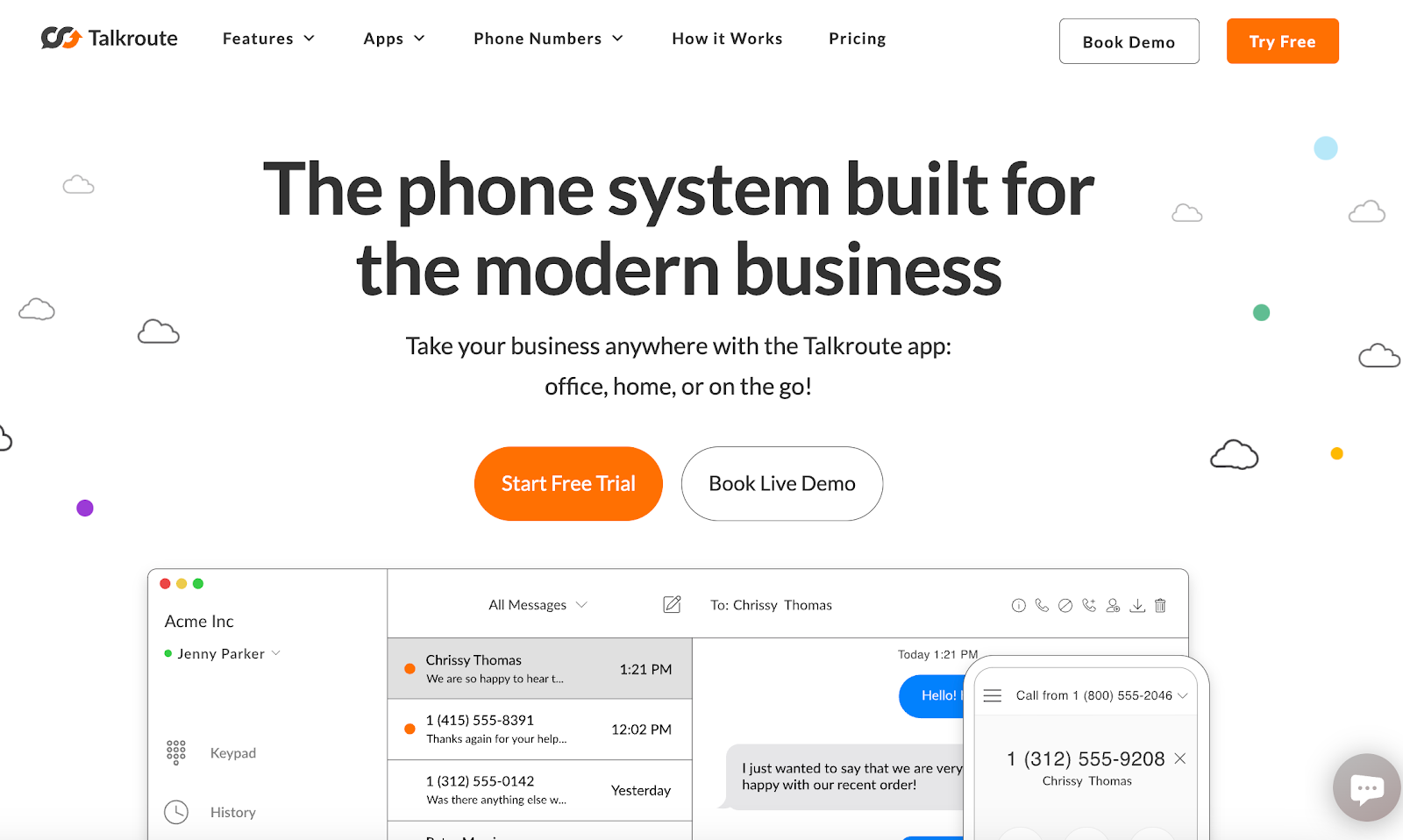Good communication is the backbone of every successful business. Phone calls, messages, and meetings are part of everyday operations, and the way these are handled can make a big difference in customer experience and overall productivity.
Cloud telephony is a phone system that uses cloud technology to manage calls and other communication tools over the internet.
In this article, we’ll explore what cloud telephony is, how it works, the benefits it brings, and the features it offers your business.
What Is Cloud Telephony?
Cloud telephony, also called cloud calling, is a modern way of managing business calls through the internet.
Companies use cloud telephony services offered by a cloud telephony provider. These providers host and maintain the cloud phone system on their own servers, and businesses simply connect to it online.
This setup is part of unified communications, which brings different communication channels and tools together under one service provider.
With cloud telephony solutions, you don’t have to buy or maintain expensive on-site equipment. Everything runs through the web or mobile applications, making it simple to handle voice services from anywhere.
A cloud phone system works on a subscription or pay-as-you-go model, so you only pay for what you need.
For many businesses, this flexibility makes cloud telephony services a practical way to stay connected and manage communication costs.
Schedule your demo and watch how Talkroute makes cloud phone setup simple for growing teams.
How It Works
A cloud telephony system runs on Voice over Internet Protocol (VoIP), which uses your internet connection instead of traditional phone lines.
Here’s how cloud telephony work is handled by a VoIP service provider:
- Call setup: When you dial a number, the VoIP service provider routes the call.
- Signal conversion: Your analog voice is converted into digital data packets.
- Transmission: These data packets travel through the internet connection to the other party.
- Connection: The receiving side gets the data and turns it back into sound.
Rather than using landlines, you can connect with a VoIP desk phone plugged into your network. Another option is a softphone or a VoIP app on your computer, tablet, or smartphone. This setup makes calling simple and fast.
Since it runs on a cloud computing model, hosted telephony gives you control through an online dashboard.
You can adjust phone numbers, call forwarding, and users without relying on on-site equipment.
View plans today and discover how cloud telephony with Talkroute saves you money.
Cloud Telephony vs. Traditional PBX Business Phone Systems
For employees, both cloud telephony and traditional private branch exchange (PBX) systems feel similar when making calls. The difference lies in how each option works behind the scenes.
Cloud telephony operates on the internet and connects through VoIP service providers, while traditional phone systems depend on on-site hardware.
Cloud telephony also brings flexibility through unified communications. You can use any device with an internet connection, whether at the office, at home, or while traveling, to handle inbound calls for your business.
Starting with a cloud telephony service is quick, requiring only a VoIP provider and a broadband connection to use. No need for any business phone installation.
Traditional PBX systems, however, rely on stationary equipment tied to desk phones. They come with high upfront costs, ongoing maintenance, and fewer features.
Repairs and updates take time and money, making them harder to manage compared to modern cloud solutions.
Here’s a simple table that summarizes their differences:
|
Feature |
Cloud telephony |
Traditional PBX systems |
|---|---|---|
|
Setup |
Quick, no hardware |
On-site equipment needed |
|
Flexibility |
Works on any device |
Tied to desk phones |
|
Scalability |
Easy to add users |
Limited and costly |
|
Costs |
Subscription-based |
High upfront and upkeep |
|
Remote work |
Supported anywhere online |
Limited, office-bound |
Watch the demo today and learn why cloud telephony with Talkroute is built for modern teams.
Cloud Telephony vs. VoIP Phone Systems
VoIP and cloud telephony are closely related, but they serve different roles.
VoIP is the core technology that makes calls possible over the internet. It converts voice into digital data packets and sends them through your internet connection.
VoIP phone systems can work on-premise with dedicated hardware or through a cloud-based phone system, giving businesses flexibility in how they set up their communication.
Cloud telephony builds on VoIP by offering a fully hosted service through a third-party provider. It comes as a complete package that includes voice calls plus advanced features like call analytics, voicemail transcription, integrations, and video calling.
With VoIP cloud telephony, you can scale quickly, manage users online, and access the provider’s customer support without handling hardware.
Both approaches can support remote work, but cloud telephony tends to simplify management with everything running in the cloud.
|
Aspect |
Cloud telephony |
VoIP phone systems |
|---|---|---|
|
Infrastructure |
Fully cloud-based phone system |
On-premises or cloud |
|
Ownership |
Managed by a third-party provider |
Business-managed if on-site |
|
Scalability |
Add/remove users easily |
Hardware limits scalability |
|
Features |
Advanced features included |
Basic features, add-ons vary |
|
Remote work |
Fully supported |
Depends on setup |
|
Cost |
Subscription model |
Hardware costs or subscriptions |
|
Data |
Cloud storage |
Local or cloud |
Get started for free and discover how Talkroute connects your team with cloud-based calling.
Cloud Telephony Features for Business Communications
Cloud telephony brings together features that help businesses manage communication, improve customer service, and support growth. Below are the key features explained in detail.
VoIP Technology
Cloud telephony includes VoIP as the foundation. It converts voice into digital data packets that travel over the internet instead of traditional phone lines. This makes inbound and outbound calls clearer and more reliable.
It also lowers costs compared to legacy systems, especially for long-distance and international communication.
Businesses benefit from better call quality, fewer dropped connections, and easier access to advanced features that old landline systems cannot support.
Virtual Phone Numbers
With virtual phone numbers, companies can create a local or international presence without needing physical offices in those locations.
Customers often feel more comfortable calling a local number, which builds trust and increases accessibility.
Companies can choose from different types of business numbers:
- Local numbers: Give the appearance of being part of a specific city or region.
- Toll-free numbers: Let customers call without charge, which is good for support or sales lines.
- International numbers: Help build a presence in other countries without setting up offices there.
- Vanity numbers: Use memorable patterns or words (like 1-800-FLOWERS) to make them easy to recall.
For businesses expanding into new markets, this feature makes it easier to connect with clients worldwide while maintaining a professional image.
Call Routing and Interactive Voice Response (IVR)
Call routing and IVR systems direct calls to the right department or agent based on the time of day, caller location, or menu selections.
This improves customer service by reducing wait times and getting callers to the right person quickly.
For example, an IVR menu can route sales inquiries to one team while directing technical support requests to another.
Call Forwarding and Voicemail
Call forwarding makes sure you never miss an important call. When someone dials the office number, the call can go straight to a mobile phone or a remote worker right away.
Voicemail adds another layer of flexibility by allowing customers to leave messages when staff are unavailable.
These voicemails can then be accessed at any time through an online dashboard, keeping communication organized and reducing missed opportunities.
Call Recording and Analytics
Call recording allows you to save conversations for training, compliance, and dispute resolution.
It helps managers review agent performance and improve service quality. Analytics go a step further by providing insights into call volumes, peak hours, and customer behavior.
This information makes it easier to optimize staffing, track performance, and identify opportunities to improve service.
Video Conferencing and Instant Messaging
Cloud telephony is not limited to audio calls. Video conferencing makes meetings more personal and effective, especially for remote teams.
Instant messaging provides a quick way for employees to share updates, files, or customer information in real time.
Together, these tools create a unified communications platform where teams can switch easily between calling, messaging, and video collaboration.
Book your demo now and see how Talkroute turns the cloud into your business phone system.
Security and Reliability
Security is a top concern for any business communication system. Cloud telephony protects calls and data with transport layer security (TLS) encryption, which prevents unauthorized access.
In addition, cloud providers use redundant infrastructure, meaning services stay available even if one server fails. This reliability keeps business communication running without interruptions.
Additional Features
Cloud telephony platforms often include features that go beyond traditional phone systems. Auto dialers speed up outbound calls, while voicemail transcription turns messages into text for easier review.
Bulk SMS allows you to send announcements or promotions quickly. Post-call surveys capture customer feedback in real time.
All of these tools can be managed through an online dashboard, making communication more versatile and efficient.
Scalability and Flexibility
Unlike traditional systems that require new hardware, cloud telephony lets businesses add or remove users in minutes. This flexibility is especially helpful if you’re a growing company or one with seasonal staffing needs.
New features can also be activated without major upgrades, making it easy to adapt to changes in business size or structure.
Integration With Business Tools
Cloud telephony service providers integrate with CRM, helpdesk software, project management software, and marketing platforms.
This means when a customer calls, agents can see their history, preferences, or open tickets on the same screen.
Such integrations allow for more personalized service and reduce the time spent switching between different systems, improving both efficiency and customer experience.
See how Talkroute’s cloud telephony connects teams and customers in one platform.
Benefits of Cloud Telephony for Businesses
Cloud telephony has become a smarter way for businesses to manage communication. Below are the key benefits explained in detail.
Save Money on Communication Costs
Cloud telephony eliminates the need for bulky on-premise equipment and high upfront investments.
Instead, you pay a subscription fee that matches their usage, which makes it easier to control expenses. For example, a company with clients overseas can save a lot on international calls because cloud calling service providers often include lower rates.
Over time, this reduces both setup and maintenance costs compared to traditional phone systems.
Scale Your Phone System With Ease
Growing companies often struggle with traditional systems because adding new users means buying extra hardware. With cloud telephony platforms, scaling is simple.
If your business hires seasonal staff, you can add new users for a few months and remove them later without wasting costs.
This flexibility makes it easier to keep communication systems aligned with changing business needs.
Keep Remote Teams Connected
Supporting remote workers is one of the biggest strengths of cloud telephony. Employees can answer inbound calls or make outbound ones from anywhere using laptops, smartphones, or VoIP desk phones.
For instance, a sales rep traveling abroad can still take customer calls through the company’s cloud platform.
This level of access helps maintain quality service while keeping business continuity strong.
Boost Team Productivity
Cloud communications providers do more than handle voice calls. They bring together unified tools like instant messaging, video meetings, and CRM integrations in one place.
This means employees don’t waste time jumping between apps. For example, an agent handling a customer query can see their account history on the same dashboard while talking on the phone.
Stay Reliable Even During Outages
One of the major advantages of cloud telephony is its resilience. Because data and calls are hosted in multiple cloud data centers, communication keeps running even if one server goes down.
If a storm cuts power at your office, your staff can still log in from home and continue serving customers.
This level of reliability ensures voice calls and inbound calls stay uninterrupted, which is key for maintaining customer trust.
Activate your free trial and test how Talkroute keeps your calls running smoothly in the cloud.
Access Advanced Features Without Extra Hardware
Cloud telephony platforms give you features that used to be available only to big enterprises.
Call recording helps with training and compliance. Analytics provide insights into peak call times and agent performance.
Interactive voice response and auto attendants guide callers quickly to the right department. These features not only improve customer experience but also streamline business processes.
Manage Everything From a Single Dashboard
An online dashboard makes system management much simpler. Admins can add users, assign virtual phone numbers, set up call routing, or review call logs with just a few clicks.
For example, if a new employee joins the team, their phone line can be set up instantly without waiting for IT.
This centralized control saves time and reduces the need for technical staff to manage everyday communication tasks.
Protect Calls With Strong Security
Security is a top concern for every business. Cloud telephony providers use tools like TLS, encryption, and multi-factor authentication to protect sensitive information.
Many also comply with strict regulations like the HIPAA for healthcare or the GDPR in the EU. This makes cloud calling service a safe option for companies that handle private customer data.
Expand Without Breaking the Budget
Startups and small businesses often cannot afford traditional enterprise phone systems. By choosing a cloud telephony provider, they can access enterprise-level features without large investments.
A small marketing agency, for example, can use advanced features like call routing, voicemail transcription, and CRM integration from day one, paying only a monthly subscription.
Recommended reading
6 Strategies for Effective Overflow Call Handling
VoIP vs Landline: Which Option Is Right for You?
Upgrade Your Business Communications With Talkroute

Talkroute gives you the tools to connect, collaborate, and grow without the limits of a traditional phone setup.
By running on cloud technology, Talkroute works as more than an existing business phone service; it becomes a complete cloud telephony solution that supports calls, texts, video, and team collaboration.
Whether you’re managing a small team or running a large company, Talkroute makes it simple to handle communication from anywhere.
Here’s why businesses choose Talkroute:
- Connection: Keep your existing business phone service or set up a new number, all managed from one platform.
- Flexibility: Use cloud technology to handle calls, texts, and meetings, whether you’re in the office, at home, or on the road.
- Features: Get advanced tools like call forwarding, call routing, voicemail-to-email, and call recording without extra hardware.
- Growth: Scale with cloud telephony by adding or removing users and features as your business expands.
- Control: Manage everything through an online dashboard that gives you full visibility of your communications.
FAQs About Cloud Telephony
What is cloud telephony?
Cloud telephony is an agile telephone system that works over the internet instead of a regular phone line. It lets businesses make and receive calls, manage voicemail, and use features like call routing and recording through a cloud service.
What is the difference between VoIP and cloud telephony?
VoIP is the technology that converts voice into digital signals so calls can happen online, while cloud telephony is the complete phone system built on top of VoIP. In short, VoIP is the method, and cloud telephony is the service.
How much does a cloud phone cost?
The cost of a cloud phone depends on the provider and features, but most plans range from about $20 to $50 per user each month.
Some providers may charge extra for advanced tools like analytics, call recording, or integrations.
What are the disadvantages of cloud telephony?
A primary disadvantage of cloud telephony is that it relies on a strong internet connection, so call quality may drop if the network is weak.
Other drawbacks include possible downtime if the provider has issues and ongoing subscription costs compared to traditional phone lines.

Stephanie
Stephanie is the Marketing Director at Talkroute and has been featured in Forbes, Inc, and Entrepreneur as a leading authority on business and telecommunications.
Stephanie is also the chief editor and contributing author for the Talkroute blog helping more than 200k entrepreneurs to start, run, and grow their businesses.




